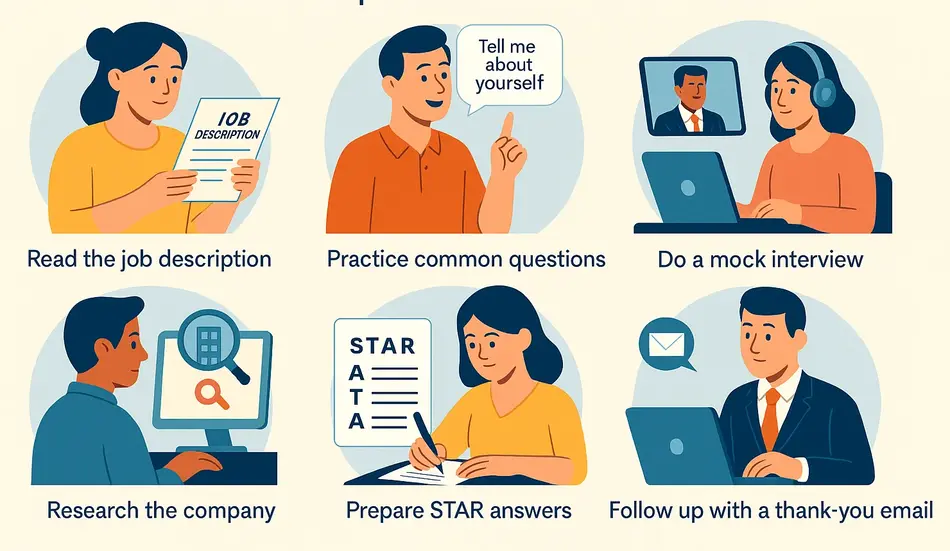Understanding the Interview Mindset: You Are the Prize
In today’s competitive job market, interview preparation strategies can make all the difference between landing your dream position and continuing the search. Many candidates underestimate their value during the interview process, approaching it with anxiety rather than confidence. As interview expert Aaron McGoff explains, “Your mindset going into a job interview is so important. Most people think, ‘I’m so grateful the company wants to interview me,’ but let’s flip that around—is this company good enough for you?”
This perspective shift represents one of the most powerful interview preparation strategies you can implement. Remember that reaching the interview stage already demonstrates your value—employers don’t waste time interviewing candidates they don’t believe could be excellent fits. The interview is as much about determining if the company aligns with your career goals as it is about proving your qualifications.
The Six-Step Framework for Interview Success
Step 1: Cultivate a Winning Mindset
The foundation of effective interview preparation strategies begins with your mental approach. Rather than positioning yourself as a hopeful applicant, recognize your value as a skilled professional who brings solutions to the organization’s challenges.
As McGoff emphasizes:
- You are highly skilled and professional
- You demonstrate good character and work ethic
- You bring collaborative and communication abilities
- Hiring you would represent a smart business decision
Remember that interviewers want to hire great candidates—it makes them look good to their superiors. They’re not searching for reasons to reject you but rather confirmation that you’re the solution to their needs. This mindset shift is among the most underutilized yet powerful interview preparation strategies available to candidates.
Step 2: Master the Job Description
One of the most tactical interview preparation strategies involves thoroughly analyzing the job posting. Your first interview will typically be with an HR representative rather than your potential manager, and these professionals are often working from a checklist of requirements rather than deep domain knowledge.
To leverage this understanding:
- Reread the job description multiple times before your interview
- Identify and highlight 10-15 keywords and phrases
- Incorporate these terms naturally into your interview responses
- Prepare answers for common interview questions using language from the description
- Practice your responses until they flow naturally without sounding memorized
For additional insight, McGoff recommends: “Go to Glassdoor.com, look up the company, click on interviews, and then people will write reports of their interview experience at that company and sometimes people will even write specific questions that they were asked.”
This research-based approach to interview preparation strategies ensures you’re speaking the company’s language and addressing their specific needs rather than giving generic responses.
Step 3: Research the Organization Thoroughly
Effective interview preparation strategies always include comprehensive company research. This demonstrates your genuine interest and helps you tailor your responses to the organization’s values and challenges.
Focus your research on:
- The company website’s About, Mission, and Values pages
- Their Careers section to understand benefits and culture
- Recent news articles about the company and industry
- The company’s LinkedIn page, particularly the People section
McGoff advises: “Type in the company name into LinkedIn and then you can browse the company’s page. I recommend clicking on the people Tab and browsing the people that work there. See if anybody who works there maybe has a mutual connection with you.”
This approach to interview preparation strategies can yield valuable connections: “Having somebody on the inside vouch for you is like 10 extra super points in a video game… it’s really powerful.”
Step 4: Prepare Thoughtful Questions
Among the most overlooked interview preparation strategies is developing insightful questions to ask at the interview’s conclusion. When an interviewer asks if you have questions, responding with “no” suggests a lack of genuine interest or preparation.
Develop 4-5 specific questions that demonstrate your:
- Understanding of the role’s challenges
- Interest in the company’s direction
- Knowledge of industry trends
- Desire to succeed in the position
McGoff recommends questions like: “Who will I be reporting to in this role?” or “What’s the single most important soft skill that someone in this role needs to succeed?”
For even more impact, ask questions that demonstrate industry awareness: “I recently saw that your competitor released a sustainable product line. Will this company be following suit?”
These targeted questions represent sophisticated interview preparation strategies that position you as a thoughtful, engaged candidate who thinks beyond the immediate job description.
Step 5: Plan Your Professional Appearance
While skills and experience matter most, appearance remains an important element of comprehensive interview preparation strategies. McGoff advises: “You can’t be overdressed, but you can be underdressed, so it’s always better to air on the side of overdressed.”
Key considerations for your interview attire:
- Dress one level more formally than the company’s standard attire
- Ensure clothes are clean, wrinkle-free, and properly fitted
- Prioritize conservative choices for traditional industries
- Consider business casual for creative or tech-focused roles
- Select appropriate professional attire based on company culture
For budget-conscious shoppers, McGoff recommends retailers like “TJ Maxx, Kohl’s, Marshalls, Target, H&M” and for mid-range options, “Everlane, Abercrombie, Nordstrom, Nordstrom Rack, Banana Republic, Bobo’s and Taylor Express.”
Remember that fit is crucial—ill-fitting clothing can undermine otherwise strong interview preparation strategies by creating an unprofessional impression.
Step 6: Conduct Mock Interviews
The final component of thorough interview preparation strategies involves practice through realistic simulations. McGoff emphasizes the importance of selecting the right practice partner: “Do a mock interview with a family member or a friend, but it’s important it has to be somebody who’s not afraid to be honest with you and give you real feedback.”
Effective mock interviews should:
- Simulate the full interview experience, including professional dress
- Include common questions and likely company-specific questions
- Be conducted without notes or preparation aids
- Include feedback on both verbal responses and non-verbal communication
- Address unconscious habits like fidgeting or poor eye contact
This practice is essential because, as McGoff notes, “Research says that 65% of what we communicate is through our body language.” Even the most carefully crafted verbal interview preparation strategies can be undermined by poor non-verbal communication.
Leveraging Digital Resources for Interview Preparation
Modern interview preparation strategies increasingly incorporate digital tools and platforms. Beyond company websites and LinkedIn, candidates can access:
- Industry forums and discussion groups
- Company review platforms like Glassdoor
- Professional networking events (virtual and in-person)
- Career development resources from trusted employment sites
- Video tutorials on interview techniques
These resources provide valuable context and insights that can enhance your understanding of both the role and organization. By incorporating them into your interview preparation strategies, you gain a more comprehensive perspective than candidates who rely solely on the job description.
FAQ: Interview Preparation Strategies
What are the most effective interview preparation strategies for researching a potential employer?
Thorough research is a cornerstone of successful interview preparation strategies. Begin by exploring the company’s website, particularly their About, Mission, and Values pages to understand their core principles. Next, review recent news articles about the organization to identify current initiatives and challenges. LinkedIn provides valuable insights into company culture and potential connections—look for employees who share your educational background or professional associations. Finally, examine industry reports to understand market positioning and competitive pressures. This multi-layered approach to research demonstrates genuine interest and provides context for tailoring your responses to the organization’s specific needs and values.
How should I incorporate keywords from the job description into my interview preparation strategies?
Integrating job description keywords into your interview preparation strategies requires a systematic approach. First, identify 10-15 key terms or phrases that appear multiple times or seem particularly emphasized in the posting. Next, create a document mapping these keywords to specific examples from your experience that demonstrate these skills or qualifications. When practicing interview responses, incorporate these terms naturally—avoid sounding like you’re simply reciting the job description. Remember that many initial interviews are conducted by HR professionals using screening checklists, so clearly articulating how you meet specific requirements using their terminology significantly increases your chances of advancing to subsequent interview rounds.
What mindset shifts should be part of my interview preparation strategies?
A powerful but often overlooked component of effective interview preparation strategies is adopting the right psychological approach. Rather than viewing yourself as a hopeful applicant grateful for consideration, recognize that reaching the interview stage means the company already sees potential value in you. Approach the conversation as a mutual evaluation—you’re assessing whether the organization deserves your talents as much as they’re determining your fit. This confidence (without arrogance) changes your body language, tone, and overall presence. Remember that interviewers want to find the right candidate; your job is to confidently demonstrate why you represent the solution to their needs, not to convince them to take a chance on you.
What role do mock interviews play in comprehensive interview preparation strategies?
Mock interviews are an essential component of thorough interview preparation strategies because they provide the only realistic way to practice both verbal and non-verbal communication simultaneously. Select a practice partner who will provide honest, constructive feedback—preferably someone with hiring experience. Conduct the simulation under conditions that mirror the actual interview, including professional attire and a formal setting. Record the session if possible to identify unconscious habits like filler words, fidgeting, or poor eye contact. Focus particular attention on the first five minutes (which often determine first impressions) and your responses to challenging questions. Multiple practice sessions allow you to refine your delivery while maintaining authenticity, ensuring your carefully prepared content isn’t undermined by delivery issues.






